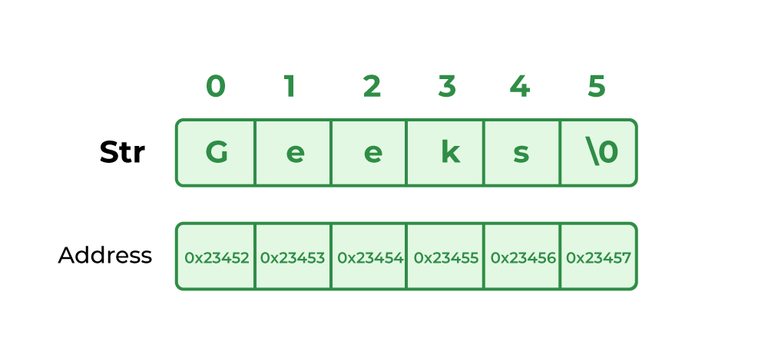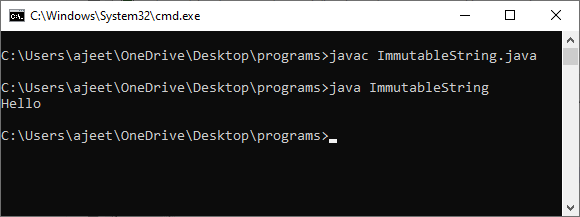Why Are Strings Immutable in Java? Thorough Evaluation for Designers
Why Are Strings Immutable in Java? Thorough Evaluation for Designers
Blog Article
What Is Immutable Strings and How It Functions
In the world of shows, recognizing the concept of unalterable strings is critical for producing safe and robust applications. Immutable strings refer to strings that can not be altered after they are created, guaranteeing data stability and predictability within the code. This basic principle plays an essential function in numerous shows languages and offers a distinct technique to managing data. By discovering the ins and outs of how immutable strings function, one can discover a world of advantages and possibilities that can elevate the quality and effectiveness of software program growth.
The Basics of Immutable Strings
Immutable strings, as an essential idea in shows, are character sequences that can not be transformed when they are produced. This indicates that as soon as a string is appointed a value, that worth can not be modified. In languages like Python and Java, strings are immutable objects, resulting in various effects in terms of memory administration and information honesty.
One of the key advantages of unalterable strings is that they offer a complacency in data manipulation. Because the content of an unalterable string can not be modified, it makes certain that the original data stays intact, minimizing the danger of unintentional modifications during program execution (Why are strings immutable in Java?). This property also streamlines debugging processes, as programmers can rely on that as soon as a string is defined, its worth will not be accidentally altered
In addition, immutable strings facilitate efficient memory usage. When a brand-new string is created based on an existing one, rather than changing the initial string, the brand-new worth is kept independently. This strategy enhances efficiency by lowering memory fragmentation and streamlining memory appropriation procedures. In general, understanding the essentials of immutable strings is vital for understanding programming ideas and optimizing code efficiency.
Benefits of Immutable Strings
Structure upon the security and efficiency advantages of unalterable strings, their advantages expand to enhancing code dependability and simplifying concurrent programs jobs. By being unalterable, strings can not be customized after creation, which removes the risk of unexpected modifications in the information they keep. This intrinsic immutability makes certain that as soon as a string is produced, its worth remains constant throughout the program's implementation, lowering the opportunities of pests brought on by unanticipated modifications.
In addition, unalterable strings add to code dependability by making it less complicated to reason concerning the state of a program. Since strings can not be altered, designers can rely on that a string will always hold the exact same worth, simplifying debugging and maintenance efforts. This predictability causes much more reputable and stable codebases.

Execution in Programming Languages
Within various programming languages, the consolidation of unalterable strings is an essential facet that affects just how information is taken care of and go to this site controlled within code frameworks. The execution of unalterable strings differs across different programs languages, with each language using its own systems to sustain this idea.

On the other hand, languages like C and C++ do not have built-in support for immutable strings. Designers in these languages must manually apply immutability by implementing regulations within their code to stop straight modifications to string things.
Best Practices for Dealing With Immutable Strings
When managing immutable strings in shows languages like Java and Python, adhering to finest methods makes certain secure and effective information manipulation. Among the essential finest techniques is to make use of StringBuilder or StringBuffer as opposed to straight adjusting strings, specifically when taking care of extensive concatenation procedures. These classes give mutable choices for string control, assisting to avoid unneeded memory allowances and improving performance.
One more ideal technique is to utilize string interpolation or format works supplied by the language rather than hand-operated concatenation. This not only enhances readability however likewise help in stopping common mistakes such as unintended string modifications. Additionally, when functioning with sensitive information such as passwords or API secrets, it is vital to avoid saving them as simple click here now text in immutable strings. Using secure storage systems like char arrays or specialized libraries for dealing with delicate information assists reduce safety and security risks related to unalterable strings.
Real-world Applications and Examples
Checking out sensible implementations of unalterable strings in her latest blog various sectors reveals their significant effect on data stability and system integrity. In the medical care market, unalterable strings play an important function in making certain the protection and confidentiality of patient data. By protecting against unauthorized adjustments to sensitive info such as medical records and prescriptions, unalterable strings help preserve conformity with rigorous personal privacy laws like HIPAA.
Economic organizations additionally gain from the unalterable nature of strings to boost the protection of customer information and purchase documents. Immutable strings aid stop fraudulence and unapproved alterations to monetary info, providing a durable protection against cyber hazards and making certain the trust fund and confidence of customers.

Conclusion
Ideal practices for working with unalterable strings include preventing straight alterations and utilizing methods that return brand-new string things. Real-world applications of immutable strings include information file encryption, caching, and string manipulation jobs.
Unalterable strings refer to strings that can not be modified after they are produced, guaranteeing information integrity and predictability within the code. When a new string is developed based on an existing one, rather than changing the initial string, the new value is saved separately.In languages like Java and Python, strings are immutable by default, indicating that when a string things is produced, its worth can not be transformed - Why are strings immutable in Java?. Finest methods for working with immutable strings consist of preventing straight adjustments and using techniques that return brand-new string items. Real-world applications of immutable strings include data security, caching, and string manipulation tasks
Report this page